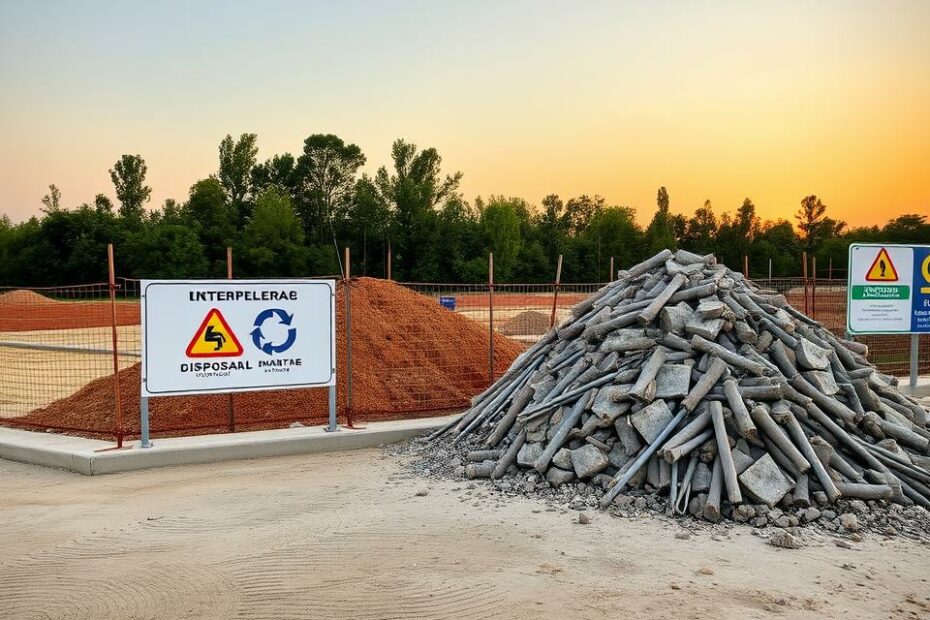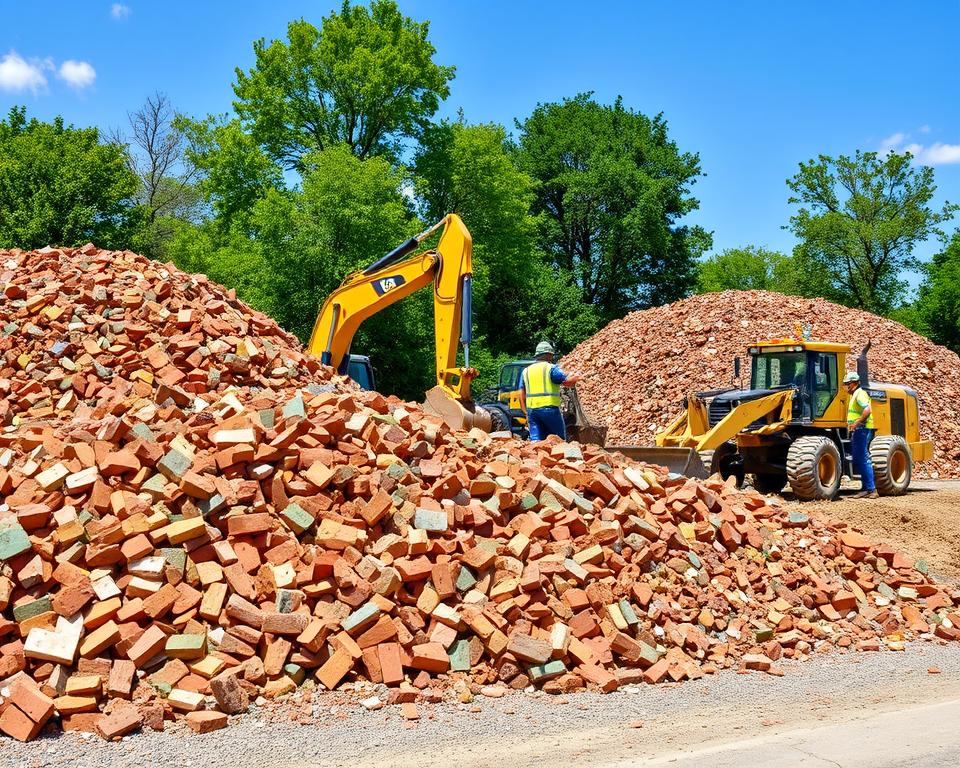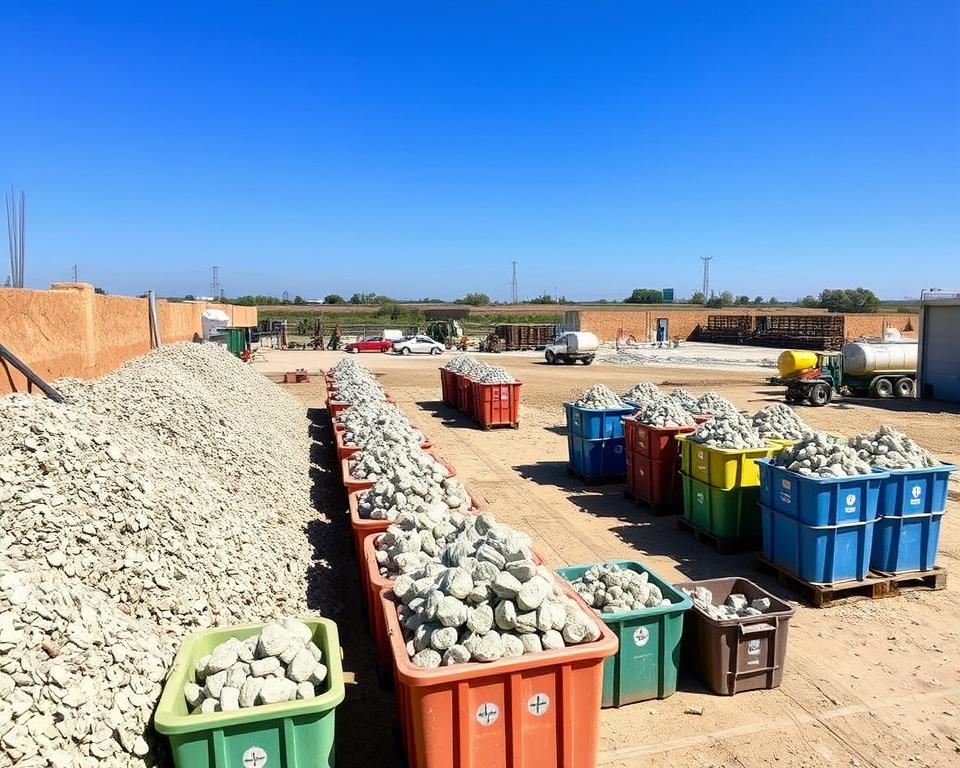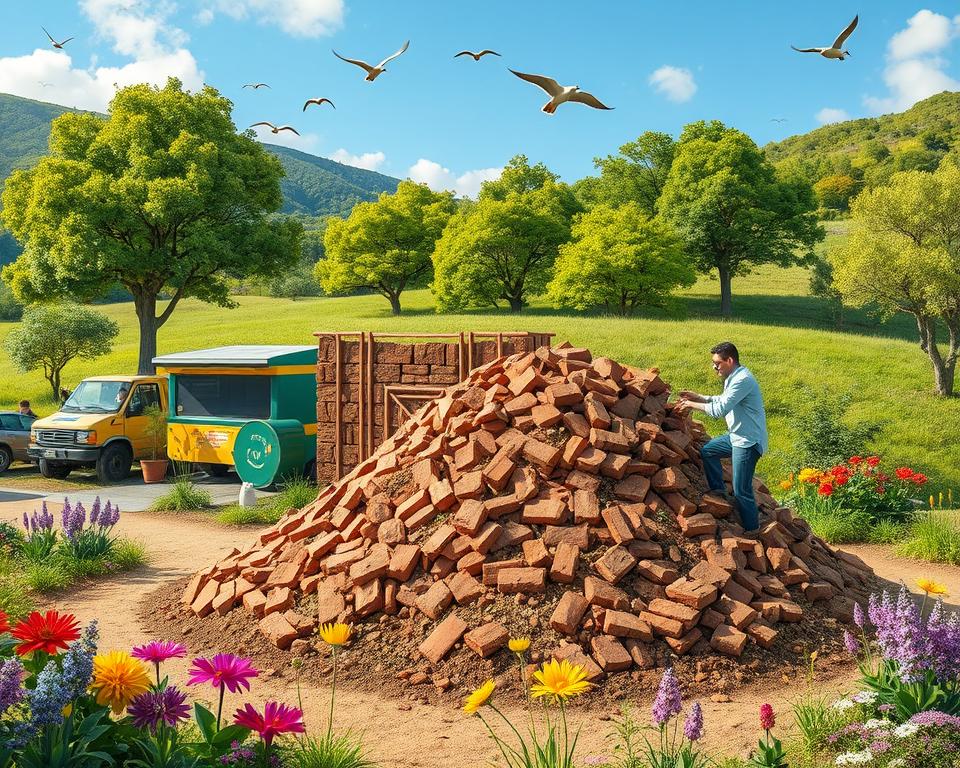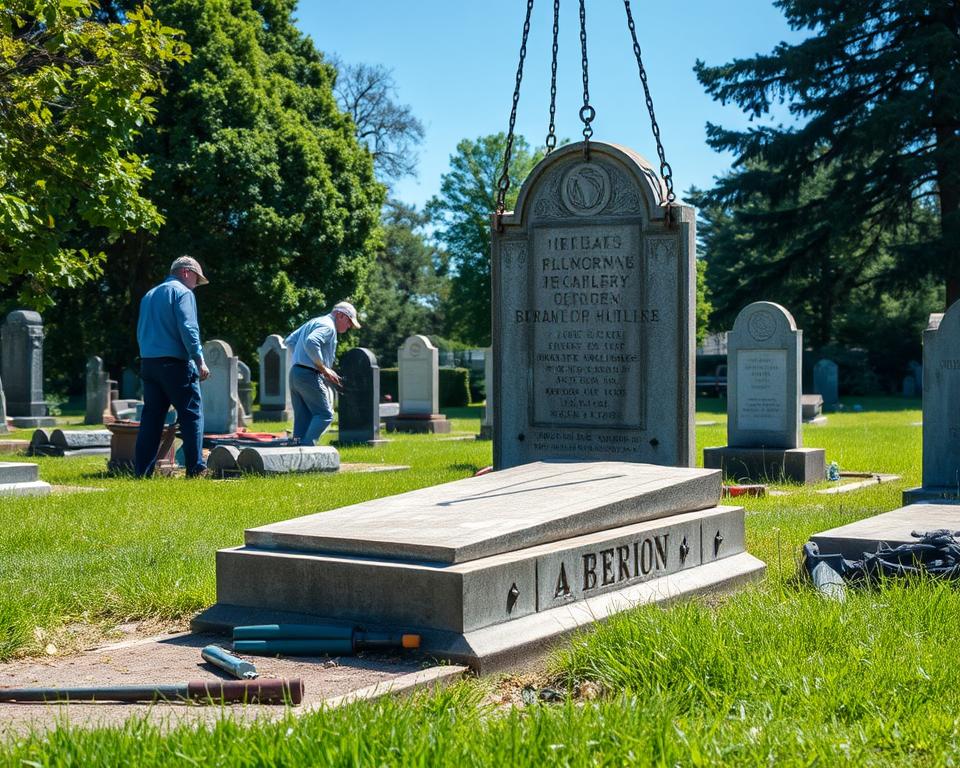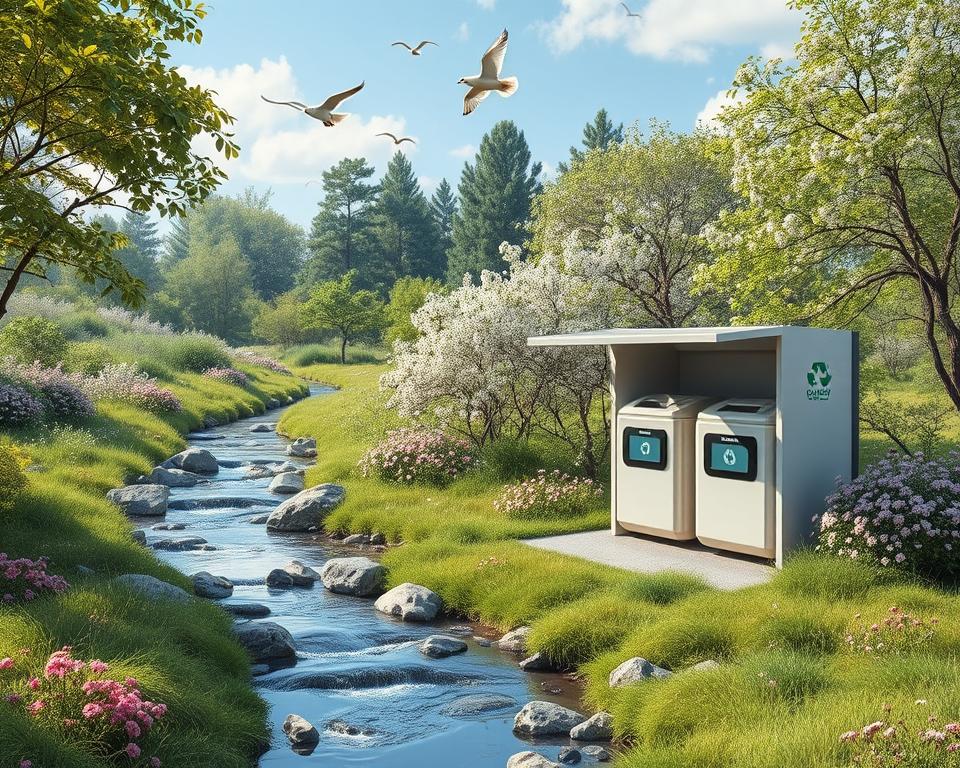As a seasoned construction professional, I’ve seen the challenges of disposing mortar. It’s often overlooked, but wrong disposal harms the environment and your business. I’m here to share my knowledge on how to safely dispose of mortar waste.
Mortar is key in masonry and construction, but it can create waste when projects end. The right disposal methods are crucial. This guide will help you dispose of mortar in an eco-friendly way and follow local laws.
Whether it’s a small home project or a big commercial build, safe mortar disposal is key. Let’s talk about why it’s important, what types of mortar waste there are, and how to dispose of it on-site or off-site. We’ll learn how to manage mortar waste well and responsibly.
Understanding the Importance of Proper Mortar Disposal
Proper disposal of mortar waste is key for protecting the environment and following the law. If mortar scraps are not handled right, it can harm the environment and health. As construction grows, managing mortar waste responsibly is more important than ever.
Environmental Concerns and Regulatory Compliance
Bad disposal of mortar waste can hurt soil and water. It has cement, sand, and additives that can leak into the ground and water. This can harm local ecosystems and upset nature’s balance. Also, many places have strict rules for throwing away construction stuff, like mortar waste. Breaking these rules can lead to big fines and legal trouble.
Potential Hazards of Improper Disposal
Badly thrown away mortar waste can also be harmful to health. The dust from handling mortar can cause breathing problems and other health issues. It can also make places slippery, which is dangerous for workers and everyone else. It’s crucial to handle mortar waste and recycle mortar scraps safely to protect the environment and keep people safe.
Knowing how to dispose of mortar properly is vital. It helps avoid environmental concerns and regulatory compliance issues. It also shows a commitment to safe and responsible building practices.
Identifying Different Types of Mortar Waste
Knowing how to dispose of mortar waste is key. There are many types, each needing its own disposal method. Let’s look at the main types of mortar waste you might see.
Hardened Mortar: This is solidified mortar, often in chunks or pieces. It can come from too much material, failed projects, or when masonry is removed.
Cured Mortar: This is mortar that has fully solidified. It’s common in demolition or renovation work.
Mortar Scraps: These are small bits left over from mixing or applying mortar. They need to be disposed of properly to avoid harming the environment.
| Type of Mortar Waste | Characteristics | Disposal Considerations |
|---|---|---|
| Hardened Mortar | Solidified, chunky pieces | May require breaking down or crushing for efficient disposal |
| Cured Mortar | Fully chemically reacted, durable material | Can be recycled or repurposed in some cases |
| Mortar Scraps | Small fragments and leftover bits | May need to be contained and transported carefully |
It’s important to know the different types of mortar waste. This helps in identifying and disposing of it properly. By understanding each type, you can create a plan for masonry rubble recycling and safe disposal.
Preparing for Mortar Disposal
Properly disposing of mortar waste starts with preparation. It’s important to separate mortar from other construction materials. This ensures a safe and efficient disposal process.
Separating Mortar from Other Construction Materials
The first step is to separate mortar from other materials. This means carefully removing it from bricks, concrete, or surfaces. Use tools like a chisel or scraper to make this easier.
Safety Precautions and Personal Protective Equipment (PPE)
When handling mortar waste, safety comes first. Wear personal protective equipment (PPE) like gloves, goggles, and a dust mask. Also, make sure the area is well-ventilated. Follow local safety precautions mortar disposal guidelines.
By preparing for mortar disposal and following safety steps, you can do it responsibly. This protects the environment and keeps you safe.
On-site Mortar Disposal Methods
There are many ways to dispose of mortar on-site. One great option is to reuse or recycle it. Hardened mortar can be broken down and used in other construction projects. This helps reduce waste and saves natural resources.
Reusing or Recycling Mortar
Recycling mortar is a smart choice. Hardened mortar disposal means breaking it down into smaller pieces. These pieces can then be used in new projects or as fill for landscaping.
This approach not only cuts down on waste. It also means less need to get and move new materials.
| Disposal Method | Benefits | Considerations |
|---|---|---|
| Reuse or recycle mortar |
|
|
| On-site mortar disposal |
|
|
Exploring these on-site disposal methods helps construction pros manage mortar waste. It makes the construction industry more sustainable and eco-friendly.
Off-site Mortar Disposal Options
There are many ways to get rid of mortar waste off-site. It’s important to pick the right place to dispose of it. This ensures we handle construction waste in a way that’s good for the environment and follows the law. We’ll look at what to consider when choosing a disposal spot for your mortar waste.
Choosing the Right Disposal Facility
Finding the perfect off-site mortar disposal spot means looking at several things. First, check out local concrete waste disposal and construction debris removal services. Make sure they focus on off-site mortar disposal and have the right permits and certifications.
When choosing a mortar disposal facility, think about these:
- Do they follow environmental laws and local rules?
- Is it close to your construction site for easy transport?
- Can they handle the amount and type of your mortar waste?
- Do they offer recycling or reuse for the concrete waste?
- Is their pricing fair and do they bill clearly?
- What do other customers say about their service?
By looking at these points, you can make sure your off-site mortar disposal is done right. It will be good for the environment and won’t cost too much. Plus, it will avoid any legal problems from not managing waste properly.
Dispose Mortar: Best Practices and Guidelines
Properly disposing of mortar is key to protecting our environment and following local laws. By using recommended methods, you can manage mortar waste well. This helps reduce its negative effects. Let’s look at how to dispose of mortar the right way.
Separate Mortar from Other Materials
First, separate mortar from other building materials like bricks and concrete. This makes it easier to sort and dispose of each item correctly.
Identify Disposal Options
- Look into reusing or recycling mortar waste. Many recycling centers can process it for new projects or as fill.
- If recycling isn’t possible, find local cement disposal methods. Look for licensed facilities that can handle mortar waste safely.
Follow Safety Protocols
Always follow safety rules when dealing with mortar. Wear personal protective equipment (PPE) like gloves and goggles. This protects you from harmful substances.
Transport and Dispose Properly
When moving mortar waste, make sure it’s in a secure container. Avoid spills. Follow the guidelines for mortar disposal at the disposal site.
Consider Masonry Rubble Recycling
If you’re removing masonry, think about masonry rubble recycling. It’s a green way to reduce waste and support the circular economy.
By following these best practices for mortar disposal, you handle waste safely and responsibly. Remember, proper disposal is not just a legal duty. It’s also essential for protecting our environment.
Handling Hardened or Cured Mortar Waste
Dealing with hardened or cured mortar waste is tough. It has gone through a chemical change, making it strong and hard to break down. It’s important to handle and dispose of it safely and responsibly.
Breaking Down Large Chunks
Hardened mortar often forms big, hard chunks. To tackle these, some effective methods are:
- Mechanical Demolition: Tools like jackhammers or chisels can break down the chunks into smaller pieces.
- Chemical Softening: Special chemicals can soften the mortar, making it easier to handle.
- Thermal Treatments: High heat, like in a kiln, can make the mortar brittle and easier to break.
It’s key to follow safety rules and wear the right protective gear when working with hardened mortar. This helps avoid health risks.
| Mortar Disposal Method | Advantages | Disadvantages |
|---|---|---|
| Mechanical Demolition | Effective for breaking down large chunks, readily available equipment | Can be labor-intensive, potential for dust and debris creation |
| Chemical Softening | Reduces the physical effort required, can be more precise | Requires specialized chemicals, potential environmental concerns |
| Thermal Treatments | Thoroughly breaks down the mortar, can be more efficient | Requires specialized equipment, potential for high energy consumption |
Choosing the right method and following local rules and safety guidelines is vital. This ensures the safe and proper disposal of hardened mortar waste.
Masonry Rubble Recycling and Repurposing
In the construction world, getting rid of mortar waste and masonry rubble is tough. But, these materials can be recycled and reused. This way, builders can lessen the harm to the environment and help the economy go full circle.
Recycling masonry rubble has many perks. It lets us repurpose mortar waste for many uses. Crushed rubble can be mixed into new concrete, cutting down on the need for raw materials. Also, the mortar in the rubble can be used again as a glue in new buildings.
To recycle masonry rubble well, teams need to sort it first. They sort it into types like brick, concrete, and mortar. This way, they can use the right methods to recycle each type, making the most of it.
After sorting, the rubble goes through crushing, screening, and washing. This makes sure the recycled materials are clean and good enough for new projects.
By recycling masonry rubble, construction companies can do less harm to the planet. They can also make money by selling or using the recycled materials in their own projects. This makes the whole industry more sustainable.
Managing mortar waste and masonry rubble in a green way is key to building responsibly. By finding new ways to use these materials, builders can cut down on waste and help the environment. This makes our built world better for everyone.
Surplus Mortar Management
Managing surplus or unused mortar is key to reduce waste and keep your materials in good shape. The focus should be on storing and protecting unused mortar well.
Storing and Protecting Unused Mortar
To store unused mortar right, follow these tips:
- Keep the mortar in its original, airtight container or packaging to prevent it from drying out or hardening.
- Store the mortar in a cool, dry place, away from direct sunlight and moisture.
- Ensure the storage area is clean and free of any debris or contaminants that could compromise the mortar’s quality.
- Consider using a moisture-absorbent material, such as silica gel, to help maintain the proper humidity levels in the storage area.
To protect the mortar from the environment, try these:
- Cover the mortar containers with a tarp or plastic sheeting to shield them from the elements.
- Elevate the mortar containers off the ground to prevent moisture and dirt from seeping in.
- Regularly inspect the stored mortar for any signs of deterioration or hardening, and take immediate action to address any issues.
By using these surplus mortar management methods, you can keep the mortar in good condition. This reduces waste and makes sure the material is ready for future use.
Legal and Regulatory Considerations
Disposing of mortar waste requires knowing the legal and regulatory rules. These rules are in place to protect the environment and public health. It’s important to follow them to avoid fines and penalties.
Mortar disposal has to deal with environmental concerns mortar disposal. It can contain harmful materials like cement and lime. If not disposed of right, it can harm soil, water, and wildlife.
There are also regulatory requirements mortar that must be followed. Each area has its own rules for handling and getting rid of mortar waste. These rules cover how to separate waste, transport it, and where to dispose of it.
Not following these legal considerations mortar disposal can lead to big fines and even jail time. It’s key to know the laws in your area before you start disposing of mortar.
- Familiarize yourself with local, state, and federal regulations governing mortar disposal
- Ensure proper waste segregation and labeling to meet regulatory requirements
- Utilize licensed and approved disposal facilities to handle mortar waste
- Document all disposal activities to demonstrate compliance
By knowing and following the legal and regulatory rules, you can dispose of mortar waste safely. This helps protect the environment and avoids expensive penalties.
Conclusion
In this guide, we’ve looked at why it’s key to dispose of mortar waste safely. We’ve covered the environmental risks and the need to follow the law. We’ve also talked about the different kinds of mortar waste and how to handle it responsibly.
Construction workers and homeowners can now safely dispose mortar by following our tips. This helps avoid dangers and keeps our planet safe. You can reuse or recycle mortar on-site or find the right places to dispose of it off-site.
Using these methods helps protect our environment and follows local rules and standards. By being proactive in safely dispose mortar, you help make our future greener. This also reduces the harm construction waste can cause to our communities.
FAQ
What are the environmental concerns and regulatory requirements for proper mortar disposal?
Not disposing of mortar right can harm the environment. It can pollute soil and water. Laws are in place to keep us safe and the planet clean.
What are the potential hazards of improper mortar disposal?
Wrong disposal of mortar can be bad for your health. It can also lead to legal trouble for breaking environmental rules.
How can I identify different types of mortar waste?
There are many kinds of mortar waste, like hardened or cured mortar, and scraps. Knowing what you have helps you dispose of it right.
What safety precautions should I take when preparing for mortar disposal?
Always wear protective gear and separate mortar from other materials. This keeps you and the environment safe.
What are the on-site options for disposing of mortar?
You can reuse or recycle mortar on-site. This is good for the planet and saves money. But, you need to know how to handle it.
What are the off-site disposal options for mortar?
For off-site disposal, pick a facility that knows how to handle mortar waste well. This is key for the environment.
What are the best practices and guidelines for disposing of mortar?
Follow the best practices and guidelines. This includes how to contain, transport, and document mortar waste. It’s all about doing it right.
How can I handle hardened or cured mortar waste effectively?
Hardened or cured mortar needs special care. You might need to break it down to get it ready for disposal or recycling.
What are the opportunities for recycling and repurposing masonry rubble containing mortar?
Masonry rubble, including mortar, can be recycled and reused. This reduces landfill waste and is good for the planet.
How should I manage surplus or unused mortar?
Store surplus or unused mortar properly. This keeps it from going to waste and makes it ready for future projects.
What are the legal and regulatory considerations for mortar disposal?
Know and follow local, state, and federal laws for mortar waste disposal. This avoids fines and protects the environment.
